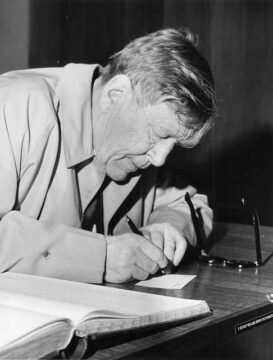David Mason at The Hudson Review:
 For Christmas lunch, 1937, Virginia and Leonard Woolf hosted John Maynard Keynes and his wife, Lydia. Imagine the talk, which no doubt ranged widely, including gossip about younger writers like W. H. Auden, the recipient that autumn of the King’s Gold Medal for Poetry from George VI himself. A lot of people were saying it: Auden was the man to watch. At only thirty, he was already regarded as England’s leading poet, head of a squadron of younger writers, including Louis MacNeice, C. Day-Lewis and Stephen Spender. According to Nicholas Jenkins’ important new book, The Island: War and Belonging in Auden’s England,[1] Keynes was “offended by Auden’s standards of personal hygiene,” telling the Woolfs that the poet was “very dirty but a genius.”
For Christmas lunch, 1937, Virginia and Leonard Woolf hosted John Maynard Keynes and his wife, Lydia. Imagine the talk, which no doubt ranged widely, including gossip about younger writers like W. H. Auden, the recipient that autumn of the King’s Gold Medal for Poetry from George VI himself. A lot of people were saying it: Auden was the man to watch. At only thirty, he was already regarded as England’s leading poet, head of a squadron of younger writers, including Louis MacNeice, C. Day-Lewis and Stephen Spender. According to Nicholas Jenkins’ important new book, The Island: War and Belonging in Auden’s England,[1] Keynes was “offended by Auden’s standards of personal hygiene,” telling the Woolfs that the poet was “very dirty but a genius.”
We rarely associate Auden’s poetry with the slovenly and remember his tidy stanzas too often as something cold and oblique, iceberg verse. His early work has been published as The English Auden (1977), appearing to emphasize the national (even nationalist) poet, a thoroughly domesticated animal. As Jenkins argues in over 500 densely written pages, there is a lot of truth in this image.
more here.
Enjoying the content on 3QD? Help keep us going by donating now.
